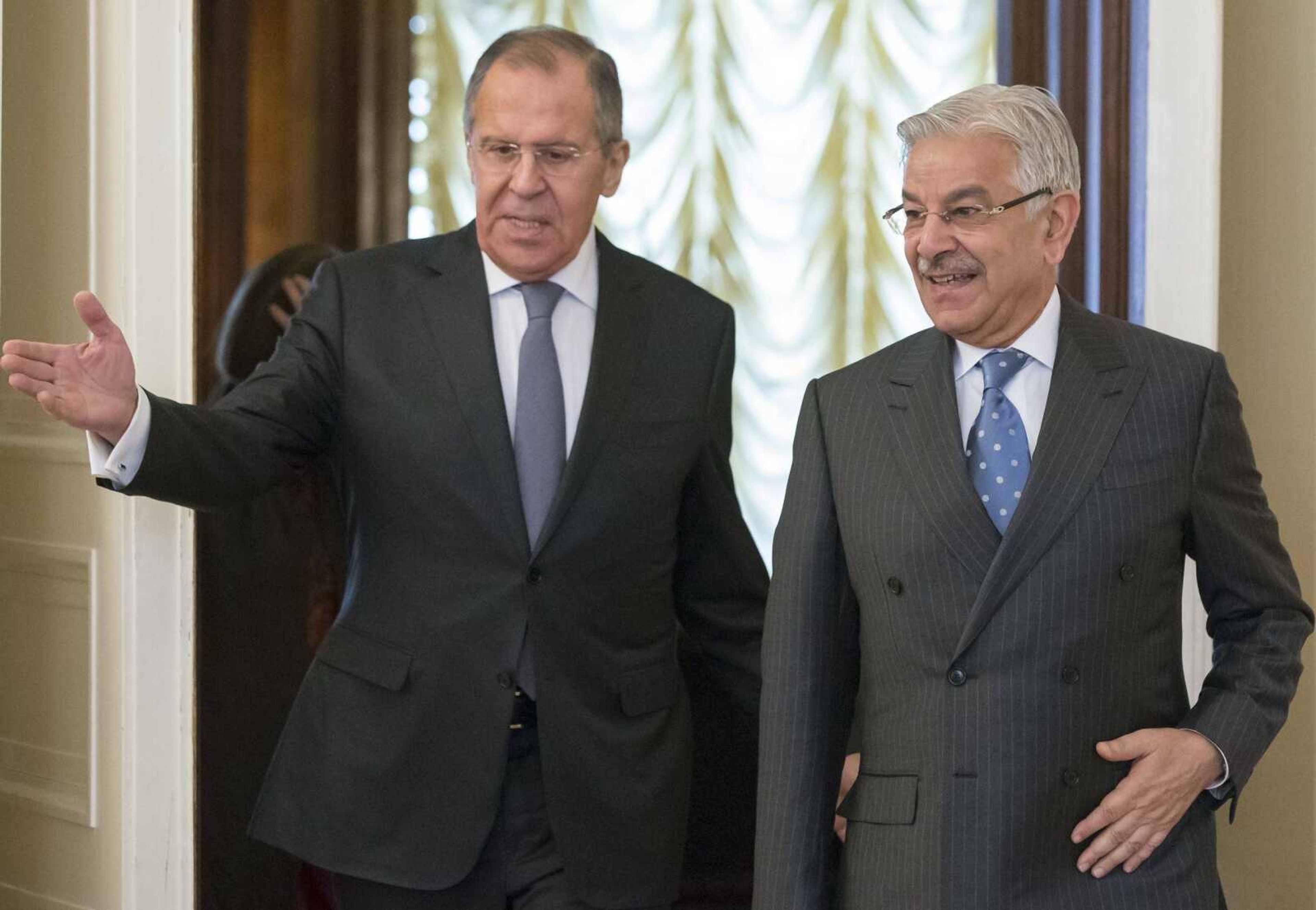Shifting alliances as Pakistan manages relationship with U.S.
ISLAMABAD -- As Pakistan navigates its troubled relationship with the United States and scrambles to avoid being blacklisted for doing too little, too late to stop terror funding, regional alliances are shifting and analysts ponder whether a cozier relationship with countries such as Russia will complicate efforts to move toward peace in neighboring Afghanistan...
ISLAMABAD -- As Pakistan navigates its troubled relationship with the United States and scrambles to avoid being blacklisted for doing too little, too late to stop terror funding, regional alliances are shifting and analysts ponder whether a cozier relationship with countries such as Russia will complicate efforts to move toward peace in neighboring Afghanistan.
Russia, analysts say, is motivated by fears of a growing presence of Islamic State militants in neighboring Afghanistan and has warmed up to Pakistan as well as to Taliban insurgents battling the upstart Islamic State group affiliate known as Khorasan Province, the ancient name of an area once including parts of Afghanistan, Iran and Central Asia.
In the latest move to strengthen ties, Russia last week named an honorary consul to Pakistan's Khyber Pukhtunkhwa Province, which borders Nangarhar province in eastern Afghanistan, where IS has established its headquarters. IS is also present in northern Afghanistan's border regions with Central Asia, causing further consternation in Moscow.
Russia's honorary consul, Mohammad Arsallah Khan, who belongs to a powerful business family in Pakistan's northwest, said economic development is the best weapon against extremism. To that end he said he will promote increased commerce with Pakistan's neighbors, including Russia, which currently accounts for barely $500 million in trade.
"I think this whole region is a bit of a mess, which I realize is one of the great understatements. Extremists have been taken lightly before, and we are where we are because of that," said Khan in an interview in the Pakistani capital. Reflecting on his business-based strategy, Khan said, "when you can give people a way of earning a living, they will turn away from terrorism, away from extremism."
The appointment reflects a stark turnaround in Pakistan's historical relationship with Russia.
In the 1980s, Pakistan and the U.S. were united against Russia as the Soviet Union sent 150,000 soldiers into Afghanistan to prop up its communist ally in the Afghan capital, Kabul. At the time, Pakistan, with U.S. backing, used Peshawar as a staging arena to arm and deploy Islamic insurgents, referred to as mujahedeen -- or as President Ronald Reagan often called them, "freedom fighters" -- to wage war on Russia. After 10 years, Russia failed to win the war and on Feb. 15, 1989, left Afghanistan in a negotiated exit.
For some, Russia's cozying up to Pakistan is a bit of a "poke in the eye" to the U.S., still embroiled in the Afghan conflict now in its 17th year and Washington's longest war, costing more than $122 billion, according to its own special Inspector General on Afghan Reconstruction.
Still, Petr Topychkanov, a senior researcher at the Stockholm International Peace Research Institute, said Russia worries about the U.S. presence in Afghanistan.
"Russia is concerned about the long-term presence of the U.S. and its allies in Afghanistan, and therefore it's in Russia's long-term interests to have an inside view of the situation in Afghanistan," he said, saying Pakistan provides the viewing platform.
Daniel Markey, senior research professor in international relations at Johns Hopkins University, said Russian relations with Pakistan aim to solve two problems for Moscow. First, to blunt the threat of IS from Afghanistan. Second, to undermine U.S. influence, he said.
"The point is that Russia and Pakistan probably have more in common with respect to the war in Afghanistan than the United States has with either -- and this is a real turnaround from prior history."
Last week Russia's Foreign Minister Sergey Lavrov accused Washington of failing to go after the Islamic State group in Afghanistan.
In response, Washington's senior diplomat for South Asia, Alice Wells, accused Russia of ignoring anti-IS offensives launched by U.S. and Afghan forces in eastern Afghanistan, while at the same time pursuing them in new havens, particularly in northern Afghanistan.
Wells suggested Russia "should unequivocally support the Afghan government," if it wants to end the conflict in Afghanistan, a thinly veiled reference to allegations of Russian support for the Taliban.
The linchpin in Washington's Afghan strategy is to put pressure on Pakistan to close safe havens used by Taliban fighters, most notably the Haqqani network, blamed for the more brazen and deadly attacks on Kabul.
To that end Lisa Curtis, senior director for South and Central Asia on the U.S. National Security Council, quietly conducted a series of meetings in the Pakistan capital on Monday, before leaving early Tuesday.
In the meetings, Curtis pressed Pakistan to put an end to the "Haqqani network and other terrorist groups" she said were operating on its territory, according to a statement issued by the U.S. Embassy.
Pakistan denies organized camps exist on its territory, though it says insurgents move throughout the country among the Afghan refugee population of 1.5 million. Pakistan also assails Afghanistan for allowing anti-Pakistan militants to have territory from which they plot and carry out attacks against Pakistan.
According to the U.S. Embassy, Curtis said "the United States seeks to move toward a new relationship with Pakistan" but she made it clear it won't happen until Pakistan moves on the Haqqani network and other militants.
Connect with the Southeast Missourian Newsroom:
For corrections to this story or other insights for the editor, click here. To submit a letter to the editor, click here. To learn about the Southeast Missourian’s AI Policy, click here.








